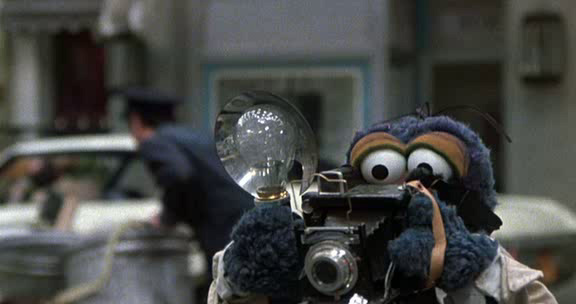We will not have have Richard Nixon to kick around much longer—which is not especially “sorrowful news” to a lot of people, except that the purging of the cheap little bastard is going to have to take place here in Washington and will take up the rest of our summer.
One day at a time, Sweet Jesus…. That’s all I’m askin’ from you…
The preceding ramble is from an article in Rolling Stone from 1974 titled “The Scum Also Rises,” chronicling the night before President Nixon announced his resignation, and everything that followed. It isn’t what a reader in 2015 would expect from insightful political coverage. The writer is clearly angry, maybe drunk, and more concerned with his own annoyances than the piece of American history that he has a front seat for. But that’s Hunter S. Thompson for you. He didn’t promise objectivity or facts, yet he delivered news more genuine than any mere recitation of events could achieve; his audacious style of writing was more than just florid indulgence, it made you feel what it was like to have been there watching history unfold.
Now, Ian McDonald is doing the same thing. Except he’s sending us to live on the moon.
We went down to the edge of the water with the ocean at our toes. Even Mãe, ankle deep in the breaking waves, sand running out from under her toes. Flowers in our hair, candles in our hands. We were waiting for the moment the edge of the moon rose over the sea. And there it was – the tiniest edge of moon, as thin as a fingernail clipping. It seemed to bleed over the horizon. Huge. So huge. Then my perceptions moved and I saw that it wasn’t rising beyond the edge of the world; it was forming out of the water. The sea was boiling and breaking and the white of the waves were being pulled together into the moon. I couldn’t speak. None of us could. Still we stood, thousands of us. A line of white and blue along the edge of Brazil. Then the moon rose clear and full and a line of silver reached across the sea from it to me. The path of Yemanja. The road the Lady walked to reach our world. And I remember thinking, but roads lead both ways. I could walk out along that road to the moon.
Luna: New Moon chronicles the fates of millions of people, all of them living an often tenuous existence upon Earth’s moon. McDonald’s new novel illustrates how the fate of these millions is decided by the machinations of a lunar aristocracy consisting of five families, the Corta among them. This is how Adriana Corta, matriarch of the Corta, speaks about her past. Just as her will shapes the actions of the Corta family, so does the rhythm of her recollection shape the narrative that McDonald delivers to us. Adriana, the author, and thus the reader have an intimate viewpoint on this particularly period of future history.
That intimate viewpoint isn’t always true. At least, this is what I assume of Luna: New Moon, since the story we’re being told is political, emotional, and evokes Hunter S. Thompson’s particular style of Gonzo Journalism.

“Gonzo Journalism” is Hunter S. Thompson’s style to own, so the easiest way to describe Gonzo is simply to say “How Thompson writes.” This style lives on beyond its creator, though, so from an objective standpoint you can spot Gonzo Journalism if what you’re reading is a mix of rowdy narration about an actual event that encompasses the feel of the event through the rhythm and diction of its word choices. Gonzo Journalism is hyperbolic, but not in the same sense that 24-hour news is. The hyperbole stems from Thompson (or the writer’s) specific viewpoint because the writer is the main character in these kinds of news pieces, despite being overshadowed by presidents, Las Vegas, Hell’s Angels, or other colorful types. Gonzo Journalism isn’t focused on lying, but it’s not focused on telling the truth or giving you the facts, either. It’s an expression of emotion; of living; it’s a story you’re hearing at a bar.
Sometimes it’s entirely fictional, like this…short play is probably the most polite way to describe it…from “The Scum Also Rises.”
“That’s right, sir. I remember when Coach Lombardi–”
Nixon cuts him off with a sudden clap of his wet hands; the sound causes two Secret Service agents in the nearby shrubbery to go for their guns. “Hold on, Ron! Just hold it right there! You know who taught Coach Lombardi everything he knew?” He smiles deeply. “Me! The President!”
Ziegler wrings his hands, his eyeballs bulge, his face is twisted with reverence. “I remember that, sir–I remember!”
“Good, Ron, good! Only losers forget… And you know what Coach Lombardi says about that.” Nixon seizes his press secretary by both elbows and comes up close to his face: His breath is foul, his eyeballs are bloodshot, his pupils are dangerously dilated, his words come in short, high-pitched barks like a rabid hyena: “You show me a good loser, Ron–and I’ll show you a loser.”
Reading that gets even funnier if you hear it as Nixon from Futurama:
https://www.youtube.com/watch?v=0O2wkfA098U&feature=youtu.be&t=2m18s
Thompson isn’t describing something that ever happened in real life (in fact, after this passage Thompson goes on to credit Ron Ziegler for being a valuable inside resource for him), he’s just trying to convey the insanity of the moment in an imagined scenario. Nixon and company are acting so desperate after the Watergate reveal, Thompson explains without explaining, that this little play-let may as well be true.
Some of the passages in Ian McDonald’s New Moon carry the same hyperbole, but with the added twist that we know this is fiction, even when New Moon reads like a feature article…that happens to be fictionalizing the lives of the Corta. It’s confusing to explain, but very clear to read. Take this scene from the beginning of the book:
‘I’ll fight you.’
Ariel Corta’s words carry clear across the court. And the room erupts. The defendant bellows: you can’t do that. The defence counsel thunders abuse of process. Ariel’s legal team—they are seconds now that the trial by combat has been agreed—plead, cajole, shout that this is insane, Alyaoum’s zashitnik will cut her apart. The public gallery is in uproar. Court journalists clog the bandwidth as they stream live feed.
A routine post-divorce custody settlement has turned into the highest drama. Ariel Corta is Meridian’s—and therefore the moon’s—leading marriage lawyer, both making and breaking. Her contracts touch every one of the Five Dragons, the moon’s great dynasties. She arranges marriages, negotiates terminations, finds loopholes in titanium-bound nikahs, bargains buy-outs and settles swingeing alimonies. The court, the public gallery, the press and social commentators and court fans, have the highest expectations for Alyaoum vs Filmus.
Ariel Corta does not disappoint. She peels off the gloves. Kicks off the shoes. Slips off the Dior dress. In sheer capri tights and a sports top, Ariel Corta stands before the Court of Clavius. Ariel claps Ishola her zashitnik on the back. He is a broad, bullet-headed Yoruba, a kindly man and a brutal fighter. Joe Moonbeams—new immigrants—with their Earth muscle mass, make the best courtroom fighters.
Does this really happen? Or is it an imagined scene meant to convey how insane and privileged and manipulative the Five Dragons–the aristocracy of the Moon–can be? The scene is both, really. Of course it doesn’t happen–this is a novel–but it’s real enough to the story of the novel that the reader can learn valuable information about how the social, cultural, and legal laws of the Moon work, which is extremely useful for the reader as the story moves forward.
The stylings of Gonzo Journalism, and the wave of 1970s-era “New Journalism” that it springs from, is extremely useful at energetically evoking a setting without dry exposition. “New journalist” Tom Wolfe was particularly masterful evoking complicated scenes with only a few words. The opening lines from his article “The Girl of the Year”:
Bangs manes bouffant beehives Beatle caps butter faces brush-on lashes decal eyes puffy sweaters French thrust bras flailing leather blue jeans stretch pants stretch jeans honeydew bottoms eclair shanks elf boots ballerinas Knight slippers, hundreds of them, these flaming little buds, bobbing and screaming, rocketing around inside the Academy of Music Theater underneath that vast old moldering cherub dome up there—aren’t they super-marvelous!
‘Aren’t they super-marvelous!’ says Baby Jane, and then: ‘Hi, Isabel! Isabel! You want to sit backstage—with the Stones!’
The show hasn’t even started yet, the Rolling Stones aren’t even on the stage, the place is full of a great shabby moldering dimness, and these flaming little buds.
As Wolfe’s article goes on its title becomes clear, Baby Jane lives exclusively in a world of artifice, semi-famous for no reason, and all too aware that she must attach herself to something of note, that she must contribute, before her year is up. Wolfe melds literary conventions into his “New Journalism” style of reporting, creating a sense of artifice within his own descriptions. In reality, Baby Jane isn’t worth writing about. But the environment that created her is newsworthy, and interesting, and Wolfe captures its near-alien nature effortlessly in that killer cinematic change in point-of-view between the first and second paragraph. You almost wish Wolfe would explain the Kardashians in the same manner. (Almost.)
We’re accustomed to this style of news today, but in softer formats, from personal rants on Facebook to gossip blog posts on Gawker. Non-fiction writers are apparent in the presenters of information, or as the presenters of an argument, but they’re rarely present within that argument, even if their piece is about a subject that affects them personally. Reading something heavily inspired by Gonzo Journalism or New Journalism is rare; a deep dive made once a year, or every other year perhaps.
I don’t know if McDonald is purposefully using the stylings of Gonzo/New Journalism for Luna: New Moon, but nevertheless it works really well for the kind of story he’s telling. (Amusingly, New Journalism was once heralded as the death toll for the idea of “the novel” as a necessary format. Let’s see… ebooks were the death toll last decade, right? I wonder what the next decade’s death toll for the novel will be.) McDonald’s storytelling style is energetic, cinematic, and fluid. Its hyperbole allows the author to convincingly portray the Corta as blind to the system of poverty that they support, even as they literally walk through it. The story perspective bounces wildly from the rich, to the stupid, to those so desperately poor they literally can’t afford the air they need to breathe, believably binding them all within the same context by the strength of the Gonzo-esque prose. Luna: New Moon gains a tremendous amount of depth in a short amount of time due to this writing technique. ALL of it seems preposterous, and you always feel as if you’re not getting the full story.
Because you’re not. You’re getting Ian McDonald’s perspective. But that just makes you want to read further. Maybe the veil comes down eventually. Maybe one of the characters comes to his or her senses and realizes what their actions have wrought. Maybe they don’t. We never found out why Nixon thought Watergate was a good idea, did we? There are some motivations we can never drag out of the silence of those involved. All we have is fiction to explain the why of history. Even if, in the case of Luna: New Moon, that history hasn’t taken place yet.
Chris Lough wants to know what Tom Wolfe meant by “eclair shanks.”










